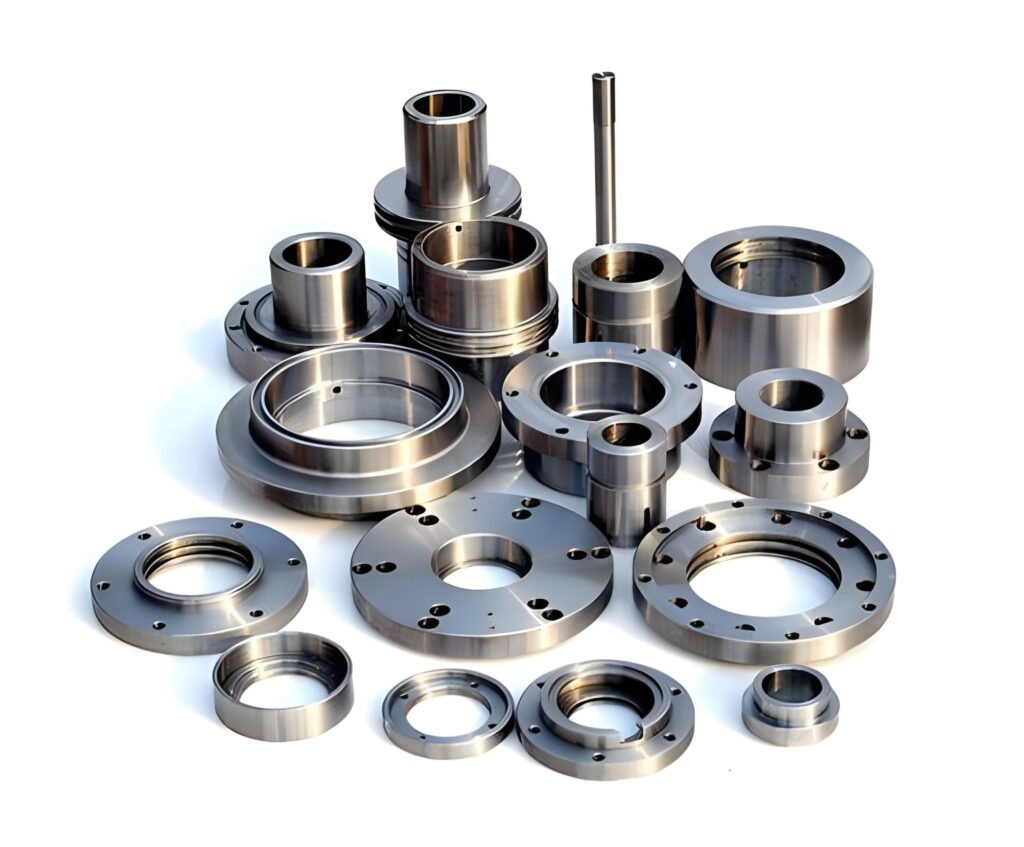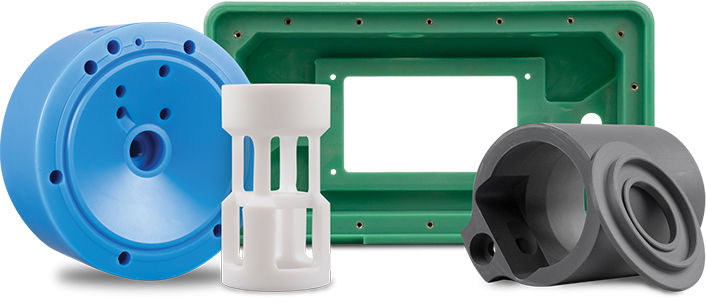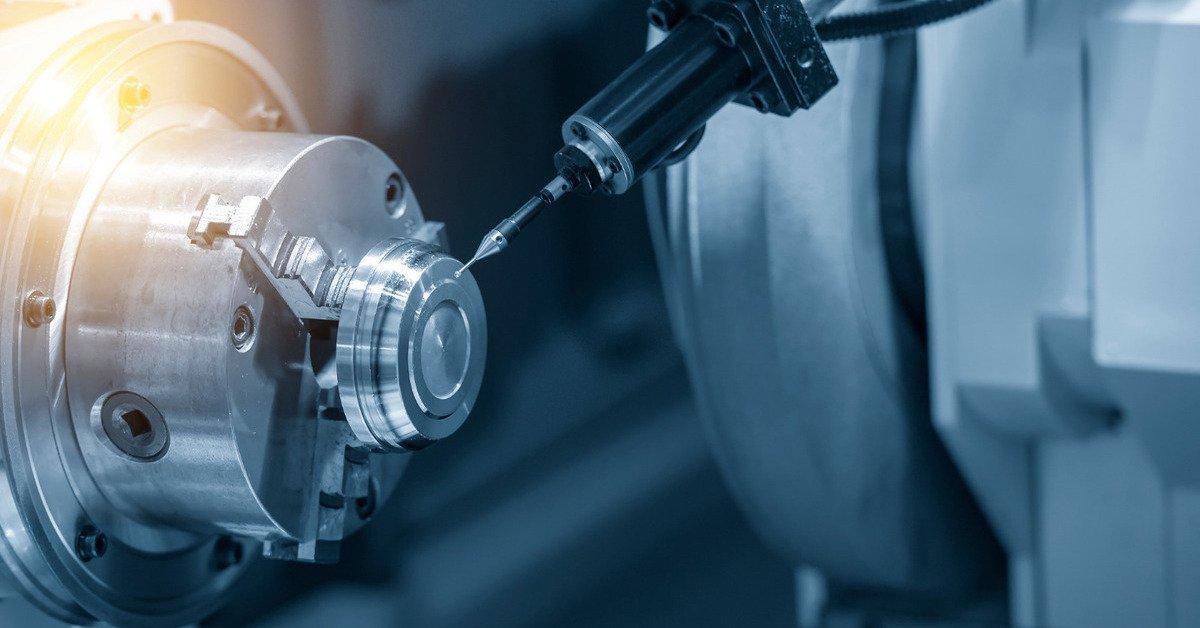Understanding the Basics of CNC Machining
Table of Contents
What Is CNC Machining?

CNC (Computer Numerical Control) machining is a manufacturing process where computer-generated code controls tools and machines to shape raw materials into precise parts and components. This method is widely used across industries such as aerospace, automotive, and electronics due to its accuracy and flexibility. The process involves subtracting material to achieve the desired shape, and it can work with metals, plastics, and more. But the material you choose plays a critical role in determining the efficiency and success of the CNC machining process.
Why Does Material Selection Matter?
Choosing the right material is crucial because it impacts the part’s durability, functionality, and the machining process itself. Incorrect material selection can lead to increased tool wear, longer production times, or even an ineffective final product. Hence, material selection should be one of the first considerations in any CNC machining project, ensuring that the material meets your part’s needs while remaining cost-effective.
Prioritizing Your Part’s Requirements
Determining Functionality and Performance
Before starting, consider: What does this part need to do? Will it face extreme temperatures or bear weight and pressure? These factors will help guide your material selection. For example, if the part needs to be lightweight but strong, materials like aluminum or titanium may be ideal. For corrosion resistance or heat endurance, stainless steel could be a better option.
Evaluating Cost vs. Durability
It’s important to balance affordability and durability. Some materials might have a lower upfront cost, but if they wear down quickly, they can lead to higher long-term expenses for replacements and maintenance. Sometimes spending a little more on the right material upfront can save money down the road.
Thermal and Electrical Properties
If your part needs to handle heat or conduct electricity, material selection is even more important. For electrical components, materials like copper or plastics with insulating properties are ideal. For parts exposed to high temperatures, steel or ceramic composites may be the better option.
Weight and Strength Considerations
Consider whether the part needs to be light or strong—or both. For instance, aluminum offers a great balance of strength and weight, making it popular in aerospace and automotive industries. On the other hand, plastics like nylon or Delrin provide flexibility and low weight but maintain durability for less stressful applications.
Identifying Commonly Used Machining Materials
Metals Used in CNC Machining
Metals are the most common materials used in CNC machining. Aluminum, steel, and more exotic metals like titanium are ideal for parts that require high strength, conductivity, or resistance to wear and corrosion.
Plastics in CNC Machining
Plastics like ABS, nylon, and PTFE are often used for parts that don’t require as much strength but need to be lightweight, flexible, or chemical-resistant. Plastics tend to be more affordable and easier to machine, particularly for complex shapes.
Plastics in CNC Machining: A Comprehensive Guide
Plastics have become a critical material in CNC (Computer Numerical Control) machining, offering a diverse range of applications across industries. CNC machining, traditionally associated with metals, has expanded to include plastics due to their versatility, cost-effectiveness, and performance properties. The use of plastics in CNC machining enables manufacturers to create precision parts, prototypes, and products with reduced weight, increased flexibility, and corrosion resistance. This article explores the advantages, types of plastics used, applications, and considerations for CNC machining with plastics.


Why Plastics in CNC Machining?
- Cost-Effectiveness: Plastics are generally cheaper than metals, making them ideal for cost-sensitive projects. Lower material costs, coupled with faster machining times, can significantly reduce production expenses.
- Lightweight: Plastics are lightweight compared to metals, which is beneficial for applications that require parts with low mass, such as in the automotive and aerospace industries.
- Corrosion Resistance: Unlike metals, plastics do not rust or corrode, which makes them suitable for environments exposed to moisture, chemicals, or harsh weather conditions.
- Electrical Insulation: Many plastics are natural insulators, making them excellent for electrical and electronic applications.
- Machinability: Plastics offer superior machinability with less tool wear compared to metals. They can be easily cut, drilled, and milled into complex shapes with minimal risk of cracking or deforming under stress.
- Wide Range of Properties: Plastics can be engineered to exhibit various mechanical, thermal, and chemical properties. This flexibility allows manufacturers to choose the most appropriate plastic material for specific applications.
Common Types of Plastics in CNC Machining
Several types of plastics are used in CNC machining, each offering distinct advantages for different industries and applications:
- ABS (Acrylonitrile Butadiene Styrene)
- Properties: ABS is a strong, tough, and impact-resistant plastic. It is easy to machine and offers good dimensional stability.
- Applications: Used in automotive parts, electronic housings, and consumer products.
- POM (Polyoxymethylene or Delrin)
- Properties: POM offers high stiffness, low friction, and excellent wear resistance. It has good machinability and dimensional stability.
- Applications: Commonly used in gears, bearings, and precision mechanical parts.
- Nylon (Polyamide)
- Properties: Nylon has high mechanical strength, good chemical resistance, and is relatively easy to machine. However, it absorbs moisture, which can affect its dimensions over time.
- Applications: Used in bushings, pulleys, and wear-resistant components.
- Polycarbonate (PC)
- Properties: Polycarbonate is known for its toughness, impact resistance, and optical clarity. It is lightweight and thermally stable but can be more challenging to machine due to its tendency to crack under stress.
- Applications: Used in safety glasses, lenses, and automotive components.
- PEEK (Polyether Ether Ketone)
- Properties: PEEK is a high-performance plastic with excellent mechanical properties, heat resistance, and chemical resistance. It is more expensive than other plastics but offers superior performance in demanding environments.
- Applications: Used in aerospace, medical devices, and automotive components requiring high strength and durability.
- HDPE (High-Density Polyethylene)
- Properties: HDPE is lightweight, impact-resistant, and has excellent chemical resistance. It is relatively easy to machine, although its low melting point requires careful temperature control.
- Applications: Common in food processing, chemical storage, and piping systems.
- PTFE (Polytetrafluoroethylene)
- Properties: PTFE, often known by the brand name Teflon, is highly resistant to heat and chemicals and has a very low coefficient of friction. It is soft and can be more difficult to machine precisely.
- Applications: Used in seals, gaskets, and components in chemical processing.
Applications of CNC Machined Plastics
The unique properties of plastics make them ideal for a broad range of industries. Here are some of the primary applications:
- Automotive Industry: Plastics are used in automotive components like gears, bushings, and housings due to their lightweight and durability. Plastics like PEEK and Nylon are often chosen for their ability to withstand high temperatures and friction.
- Aerospace: CNC-machined plastics are used in aerospace for components requiring high strength but low weight. PEEK and polycarbonate are commonly used in aircraft interiors, structural components, and cable insulation.
- Medical Devices: Plastics are increasingly being used in medical devices for their biocompatibility, sterility, and resistance to chemicals. PEEK and PTFE are often chosen for surgical instruments, implants, and diagnostic devices.
- Electronics and Electrical Components: Plastics such as ABS and polycarbonate are widely used in electrical enclosures, connectors, and insulating components due to their insulating properties and heat resistance.
- Food and Beverage: Food-grade plastics like HDPE are frequently used in food processing and packaging equipment due to their chemical resistance, non-toxicity, and ease of cleaning.
- Consumer Goods: ABS and Nylon are used in producing everyday items like electronic housings, toys, and home appliances due to their durability and cost-effectiveness.
Considerations for CNC Machining Plastics
While CNC machining of plastics offers many advantages, there are some important factors to consider:
- Material Selection: Each type of plastic has unique properties, and selecting the right material for the job is crucial. Engineers must consider the operating environment, mechanical stresses, and any chemical exposure the part may face.
- Machining Techniques: Plastics can be sensitive to heat and stress, which can cause warping, cracking, or melting. To avoid these issues, machinists must use appropriate cutting tools, speeds, and cooling systems to manage heat buildup.
- Dimensional Stability: Some plastics, like Nylon, absorb moisture, leading to dimensional changes over time. Manufacturers should account for this during the design and machining phases.
- Surface Finish: Plastics often require specific post-machining treatments to achieve the desired surface finish. Depending on the application, this may include polishing, sanding, or coating.
- Tool Wear: Although plastics generally cause less tool wear than metals, abrasive plastics like PEEK can still lead to faster degradation of tools. Using carbide or diamond-coated tools can extend tool life when machining harder plastics.
Exotic Materials for Special Applications
For specialized projects, materials like ceramics or composites may be necessary. These materials offer unique benefits, such as extreme temperature resistance or hardness, but can be more challenging to machine.
Finishing Options and Process Selection
Surface Finish Considerations
The surface finish of your part impacts both aesthetics and functionality. A smoother finish can reduce friction or enhance the appearance of the product. For example, aluminum can be polished to a sleek finish, while other materials may require additional processes to achieve a similar smoothness.
Anodizing, Plating, and Powder Coating Options
Post-machining treatments like anodizing, plating, or powder coating can improve corrosion resistance, durability, and appearance. Depending on your material and requirements, these processes can extend the part’s lifespan or make it more visually appealing.
Process Optimization for Precision
Each material requires different machining processes for high precision. Metals like aluminum are easier to machine with high accuracy, while harder materials like stainless steel may require slower machining speeds and more robust tooling. Understanding your material’s needs will help you optimize the machining process for the best results.
Types of Metal Materials for CNC Machining
Aluminum Alloys
Aluminum is lightweight, corrosion-resistant, and affordable, making it one of the most commonly used metals for CNC machining. It’s used in industries such as automotive, aerospace, and electronics.
Stainless Steel
Stainless steel is strong, durable, and resistant to corrosion, making it ideal for parts exposed to moisture or chemicals. However, it is harder to machine than aluminum and typically requires more advanced tools.
Titanium
Titanium offers exceptional strength-to-weight ratio and corrosion resistance, making it suitable for aerospace applications. However, it’s more expensive and difficult to machine, making it a specialized option.
Brass
Brass offers good machinability and electrical conductivity, making it popular for plumbing, electrical components, and decorative parts due to its aesthetic appeal.
Carbon Steel
Carbon steel is durable and strong, commonly used across various industries. However, it can rust if not treated properly, making post-machining treatments necessary.
Types of Plastic Materials for CNC Machining
Delrin (Acetal)
Delrin is popular due to its dimensional stability and low friction, making it ideal for mechanical parts like gears and bearings.
Nylon
Nylon is flexible, tough, and resistant to wear, making it a good option for parts handling mechanical stress without needing the strength of metal.
PTFE (Teflon)
PTFE is known for its low friction and excellent heat and chemical resistance, making it perfect for seals, gaskets, and non-stick applications.
Material Properties That Impact CNC Machining
Hardness
Harder materials are more resistant to wear but more difficult to machine. Balancing hardness with machinability is important for efficiency and durability.
Machinability
Some materials are easier to machine than others. For example, aluminum is known for its excellent machinability, while harder metals like titanium require specialized tooling.
Temperature Resistance
High-temperature environments require materials that can maintain their integrity without deforming. Stainless steel, titanium, and PTFE are known for their ability to withstand high temperatures.
Common Mistakes to Avoid When Selecting Materials
Ignoring Material Stress and Strain
Failing to account for how much stress your part will endure can result in part failure. Ensure the material can handle the forces it will face in use.
Focusing Solely on Costs
While it’s important to stay within budget, selecting a material purely based on cost can lead to long-term issues like faster wear or machining delays, ultimately increasing overall expenses.
How to Collaborate With Your CNC Machining Service Provider
Understanding Manufacturing Limits
Every material has machining limits. Understanding these constraints will help you avoid issues related to tool wear, precision, and time.
Requesting Prototyping and Testing
If uncertain about the material, consider requesting a prototype or test run to better understand its behaviour during machining and its final performance.
How Microfactory Chooses the Right Material for CNC Machining
Choosing the correct material for CNC machining is critical for ensuring both the performance and durability of the final product. At Microfactory, material selection is a fundamental aspect of the process, as it directly affects production efficiency, product longevity, and overall cost. Let’s explore how Microfactory expertly selects the most suitable material for CNC machining projects.
Factors Microfactory Considers When Choosing Materials
1. Application and Part Requirements
Microfactory begins by understanding the intended application of the part. The material selection depends on factors such as:
- Strength requirements: Does the part need to handle heavy loads or stress?
- Temperature conditions: Will the part be exposed to high or fluctuating temperatures?
- Corrosion resistance: Is the part going to come into contact with corrosive substances or moisture?
- Wear and tear: Will the part face friction or abrasive conditions?
For instance, if the part needs to withstand extreme conditions, Microfactory may recommend materials like stainless steel or titanium, which offer excellent strength and corrosion resistance.
2. Cost vs. Performance
One of the key considerations in material selection is balancing the cost with the performance requirements of the part. While more affordable materials like aluminum or ABS plastic are suitable for many applications, certain projects may require specialized, more expensive materials like titanium or advanced composites to meet performance standards. Microfactory helps clients weigh the long-term benefits of material durability against upfront costs.
3. Machinability
Microfactory also considers the machinability of the material. Some materials, like aluminum, are easier and quicker to machine, while harder materials like titanium may require more time and specialized tooling. Efficient machining reduces production time and tool wear, ultimately impacting the overall cost.
Common Materials Used by Microfactory for CNC Machining
Metals
Microfactory works with a wide range of metals to meet the needs of various industries. Here are some of the most commonly used metal materials:
- Aluminum: Lightweight, corrosion-resistant, and highly machinable. Aluminum is commonly used in the aerospace, automotive, and electronics industries.
- Stainless Steel: Strong, durable, and corrosion-resistant. It’s ideal for applications requiring robustness and exposure to moisture or chemicals.
- Titanium: Known for its high strength-to-weight ratio and corrosion resistance, titanium is ideal for aerospace and medical applications but requires specialized tooling due to its hardness.
- Brass: Offering excellent machinability and electrical conductivity, brass is often used in electrical components, plumbing, and decorative parts.
- Carbon Steel: A strong and versatile material, carbon steel is used across many industries but requires extra post-machining treatments to prevent rust.
Plastics
Microfactory also offers a range of plastic materials, suitable for lightweight or non-metal parts:
- Delrin (Acetal): Known for its dimensional stability and low friction, Delrin is often used for mechanical parts like gears and bearings.
- Nylon: Flexible, tough, and wear-resistant. Nylon is suitable for parts that handle mechanical stress without requiring the strength of metal.
- PTFE (Teflon): PTFE is known for its low friction and excellent chemical and heat resistance, often used in seals and gaskets.
Exotic Materials
For highly specialized applications, Microfactory also works with exotic materials like ceramics and composites, which offer exceptional hardness, temperature resistance, and durability.
Material Properties That Impact Machining at Microfactory
- Hardness: Harder materials like stainless steel or titanium resist wear but are more difficult to machine.
- Thermal and Electrical Conductivity: Materials like copper and brass offer high electrical conductivity, while others like stainless steel resist heat.
- Weight and Strength: Aluminum and titanium offer a balance between weight and strength, while plastics are ideal for lighter, less stressful applications.
Finishing Options at Microfactory
Material choice also influences the finishing options available for CNC machined parts. Microfactory offers various post-machining treatments, including:
- Anodizing: Common for aluminum parts, providing corrosion resistance and an attractive finish.
- Plating: Adds a layer of material, such as zinc or nickel, for added corrosion resistance and durability.
- Powder Coating: Used for aesthetic purposes or to add an additional protective layer.
Collaboration With Clients for the Best Material Choice
At Microfactory, the team ensures that clients are involved in the material selection process. They consider the client’s budget, part application, and production requirements to recommend the most appropriate materials.
Prototyping and Testing
Microfactory offers prototyping services that allow clients to test the material’s performance before committing to full-scale production. This step helps ensure the chosen material meets all technical and functional requirements.
Customized Solutions
If standard materials don’t fit the project’s needs, Microfactory can source specialized materials or suggest innovative solutions to meet complex requirements.
Conclusion
Selecting the right material for CNC machining involves balancing performance, cost, machinability, and finish. By focusing on your part’s specific requirements, understanding the properties of different materials, and working closely with your machining provider, you can ensure the success of your part and optimize the production process.
FAQs
1. How do I decide between metal and plastic for CNC machining?
It depends on the part’s requirements. Metals offer strength and durability, while plastics provide lightweight, flexible, or chemical-resistant alternatives.
2. What’s the most affordable material for CNC machining?
Aluminum is generally the most cost-effective metal due to its machinability and lower material costs. For plastics, ABS is commonly inexpensive.
3. How does material hardness affect CNC machining?
Harder materials are more wear-resistant but can be challenging and time-consuming to machine, increasing tool wear and production time.
4. Can I change the material after the initial machining?
While possible, changing materials mid-process is not recommended. It could lead to design alterations, different machining methods, and added costs.
5. What materials are good for high-temperature environments?
Stainless steel, titanium, and PTFE are excellent for high-temperature applications due to their heat resistance.



